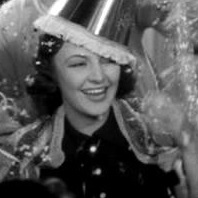|
|
|
|
Andrea Leeds, Stage Door
1937: lost to Alice Brady, In Old Chicago |
|
7 |
★ ★ ★ ★ ★
Stage Door is about coteries of spunky, articulate women hanging out in porous, complexly blocked deep-space frames, having witty, self-protective conversations about professional aspirations. Today, in the Age of Ultron, it's an ark of some foreign covenant: a movie that celebrates extraordinary women's averageness, and average women's extraordinariness. Stage Door's two most famous aspects might even be its weakest: I don't buy Hepburn's "calla lilies" emergence as a tragedienne, and I waffle on Andrea Leeds's performance as doomed thespian Kay Hamilton. She seems tapped for suffering from her first entrance, wilting with Gish-like despond against a door before assuming a braver face for her cohorts. She moons on a stairwell when pressed for rent. The script seems very modern in telegraphing Kay's eating disorder—an open secret on West 58th St.—but Leeds somewhat belabors Kay's malnutrition and fatigue, approaching an agent's secretary like Janet Gaynor's wimpier sister, then fainting in stark pantomime. La Cava directs most castmates to filter desperation and self-loathing through tartness and tough talk. Only Kay boldfaces such feelings while professing to disguise them—and she's allegedly the most gifted performer!
Oddly, though, what's dubious about the performance is exactly what's good about it. Hepburn's Terry chastises other stablemates for cloaking insecurities in repartee, whereas Leeds makes Kay nothing if not candid. Everyone sees Kay's bottomless sorrow, reacting compassionately but nervously. She relaxes around Terry, modest and adult, as if meeting her only equal. (Has any female peer ever so plausibly elicited Hepburn's interest and admiration on screen?) That said, Leeds, like the script, never confirms whether Kay overestimates her talent. She nails her most complex scene, mixing Kay's pleasure and envy when Terry reaps a coveted role, eagerness and bitterness at having to coach Terry's reading of that character, and horrid recognition that she's hit rock bottom. This bedroom exchange is the climax I prefer to remember, not Leeds's chin-clutching ghost-walk up that chiaroscuro staircase—either a memorable, bravely unusual moment in 30s Hollywood acting or a weirdly overcalculated effect. Still, the sprightly, sophisticated, occasionally bitchy Stage Door arguably benefits from Leeds's rather overt playing of "delicacy." Sometimes thwarted, unrealistic ambition sits nakedly before you, and it's just so sad. Leave a Comment
|
 |
 |
 |
 |
|
|